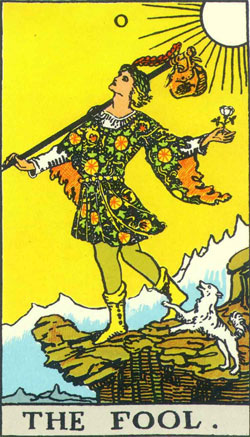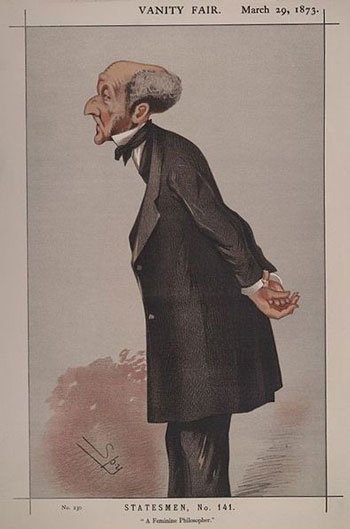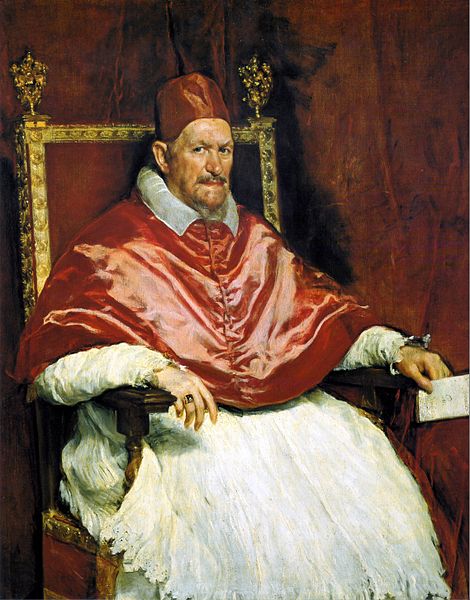Who's the Genius?
The Creator VS the Fool
The falling of an apple in no way necessitates the discovery of gravity. If an apple falls on a fool's head, the fool will simply use it as foodstuff. Each person uses things according to his own needs and abilities. For the artist or the philosopher or the scientist, everything that happens is a possible source of inspiration, every happenstance can potentially give birth to a great idea, and that gives rise to joy. For the hedonist, only the pleasure-value of things is taken into account. So the creative person has more potential sources of joy around him compared to the hedonist (what a twist!) But potential doesn't mean actual.
Note: The story that it was the falling of an apple that led Newton to his discovery of the law of gravity is, of course, a myth.

img source link
The curious case of John Stuart Mill
You create the potential for great psychological distress in the young individual when you burden him with too much learning. For much understanding betrays much investment, and now all that learning must be cashed-in. But the things the child has learned required such great effort on his part that now too much is required of the world by way of compensating his troubles. So it is quite possible that the young man will remain forever relatively unhappy compared to the man who did the least that was expected of him (the average Joe). If my theory that meaning in life partly depends on use is correct, then vast amounts of knowledge simply become an unjustified expense that needs to be cashed-in in some other way, to be "translated" into something else.
This tells us something about our culture in general: it is pointless, in our present culture, to strive to any level of genuine accomplishment, the way geniuses do, for the ultimate rewards are not much greater than those the layman can easily get hold of. The more you push and challenge yourself the greater will be your expectation of reward. When this does not come, the intellectual will rave against Nature or God or Man or the System. The things that offer the most joy are readily available, and it is these your soul desires: food, drink, sex, love. It is surely the case that laymen are "loved" at least as often as intellectuals are, and probably much oftener!
It is for this reason that it is the artists and the philosophers and the perfectionists that most often ponder the meaning of life, since it is they who carry the greatest number of bad checks. Life requires a meaning only when you put into it more than you can get out of it. Otherwise the question does not arise. Pain posits the question of life's meaning because it represents perfectly this "giving without taking." If you have worked for a decade without getting paid, because you have been promised to be paid later, and then your employer dies suddenly without making arrangements for your payment, you will then ask about work's meaning. Same with life. This question does not come up when you receive more than you give, or when you receive as much as you give. If, then, by nature we cannot profit greatly from efforts that exceed the average, this speaks against the genius—the above average.
If the things that can be attained most easily (namely food, sex, love, entertainment) are the things that offer the greatest joy, and increasingly higher attainments offer progressively less joy, then this seems to tell us, almost with a normative force, that we should not try very hard, i.e. that genius should not be our goal.
Thus geniuses find themselves forced to function on the basis of a private mythology that rivals even that of religion itself. At the heart of this mythology lies the concept of superiority: perhaps the most impotent in its practical weight than all concepts ever invented by man—yet it seems to drive the genius as if it were inexhaustible fuel.
How I have come to call a person's complete body of psychological defense mechanisms and illusions his "personal/private mythology," I have no idea. I probably used it for convenience the first time and it stuck.

John Stuart Mill, the "feminine" philosopher.
img source link
What is a genius?
According to my theory of use, what we call progress is measured by our ability to use things: the more thoroughly we are able to use them, the greater is the level of our progress. What we call genius is merely the same applied to an individual: an individual's ability to use things more thoroughly as compared to his contemporaneous fellow humans. (Could just as easily apply to an ape or any creative animal.)
The curious case of Bacon
Just when you thought a thing's value had been exhausted, someone comes along who, like some overdue alchemist, manages to distill gold from the basest substance imaginable. Great artists, engineers, and all manner of creators are merely people who can envisage novel uses for common objects. When a person can use an object in a novel way, this object offers more pleasure to that person. Francis Bacon, for instance, was enthralled with the Velasquez painting. (Diego Velasquez’s 1650 Portrait of Pope Innocent X.) He said he read many books about it and each time he looked at it he would have new ideas about it. For Bacon, the painting was an inexhaustible well of ideas.
One may think that the painting is not that interesting. But for Bacon it was interesting and important because he could use it in ways other people could not. When a person says that X is boring, it will customarily be the case that he simply cannot use X. Using something sometimes requires quite a lot of learning. Enjoying a book, for instance, requires knowing how to read. Many things we think we enjoy quite effortlessly actually require a lot of effort, but it is never consciously felt because the effort was spread out over a period of several years, or it happened at some point in the past during years of which we now have no recollection. The key to enjoying things, then, is to put some effort into learning how to use them. People often, in fact, talk of "learning to enjoy" something.

Click here to see Bacon's beautiful rendition of this painting by Velázquez.
img source link
Creativity and Meaning in Life
The person who can use the things around him to his own benefit will always be filled with vigor and will be happier than the person who is unable to make use of his surroundings. Of course, a non-human animal that only cares about food will have made a full use of the objects around it if it can eat them all, and it will be more content with life than the genius who has not managed to affix a use to every object in his periphery. Happiness, therefore, depends on the degree to which one has been able to affix a use—a meaning—to the objects that populate one's world. The creative person should normally be far more successful in this enterprise than the non-creative person, but not everything depends on the individual. (This idea that the absolutely creative person—the superlative creative genius—is an absolutely happy person, may chime well with Nietzsche's view of the superman—the creative person par excellence—as the happy person par excellence.)
Using accidents: the curious case of the Artist
How uplifting it can be when a use is found even for one's mistakes—artists being the best example of this kind of creativity, which is the reason why they seldom have a ready explanation regarding the meaning of their work. They often object fervently to anyone who says that art must have a point, a purpose, that it must be a statement, political or otherwise. Their worry is that the accidental nature of their work will be revealed if it is scrutinized too closely by the mind that seeks meaning and purpose in all human activities and creations. They worry that their work might be devalued if its chancy nature is revealed: if purpose did not guide their creation, then only chance could, and artists are not to be praised for works of chance, or at least they are not to be praised as highly as some other artist who has produced the same quality of work but whose work has a meaning. They worry that the person who condemns chance condemns their very method of creating works of art.
Yet despite all this, there is joy in being able to make use of an accident. An accident has no meaning in itself; it is pointless. But in the hands of the artist it can be turned into something remarkably beautiful, and in this way the accidental is imbued with meaning. It takes a talented and creative mind to transform an accident into something meaningful, whether this accident be a brush-stroke, a misspelling, or the conditions into which one was born.

img source link
Curtain
The theory of use helps us make sense of many aspects of human life, and helps us give more concrete and practical definitions to otherwise nebulous concepts, such as "progress", "genius", and "happiness". It helps us understand why Shakespeare, in managing to use words in ways never before imagined, is hailed as a genius. Why an artist is praised when he can take the most blasé painting - one every other artist had been exposed to - and still find new ways to look at it. Why we consider Dali's ability to see an elephant in the swan as a stroke of genius, and why individuals who can see new uses in objects are considered more intelligent.
This completes the 16th installment of the Meaning of Life series. In case you missed the other episodes:
Part 15: The Greatest Invention in the History of Humankind (No, it's not the Wheel nor the Internet)
Part 14: Wasted Beauty!
Part 13: The Survival Instinct - Does it Exist?
Part 12: What's the Use?
Part 11: Words VS Actions
Part 10: Mothers and Egos!
Part 9: Can People Share Ownership of the Same Body?
Part 8: Against Subjectivism - Is Everything Relative?
Part 7: The Value-Laden View of Life
Part 6: I Am Therefore I Harm
Part 5: Nietzsche vs Christianity: Are Christians Nihilists?
Part 4: Can we desire death?
Part 3: Are nihilists being honest when they say life has no value?
Part 2: Does death make life meaningless?
Part 1: Is it possible to be a nihilist?
I'll see you in the next episode, where I will continue exploring my theory of Use, one of the three theories in the book that explain how life may appear meaningful or meaningless to us.

Come join us on Discord! https://discord.gg/7qyarFD
Again. This is not "your theory". This is a well established theory in economics and sociology. You just changed the name from "value" to "use".
You admitted in a personal chat that you have never studied economics. The post looks idiotic because .again, you are trying to flip things around.
https://en.wikipedia.org/wiki/Value_theory
As for the genious interpretation again you are taking all my input from our private conversation and flipping them around to incorporate your theme.
https://steemit.com/philosophy/@kyriacos/the-making-of-a-genius
I will reply to your first part. Theory of value is based on the emotional connection and his is based on understanding of an object. They cover some of the same ground but are different.
Remove your flag.
False.
Example: "The labor theory of value asserts that the economic value of a good or service is determined by the total amount of socially necessary labor required to produce it. When speaking in terms of a labor theory of value, value without any qualifying adjective theoretically refers to the amount of labor necessary for the production of a marketable commodity, including the labor necessary for the development of any capital used in the production process."
https://en.wikipedia.org/wiki/Theory_of_value_(economics)
There is an understanding about what a human society needs and therefore values. You can interchange it easily about how it "feels". Rest assured economics deals with understanding, not feeling.
ps: Just because he comes whining like a little bitch he is to you (knowing you have a beef with me doesn't mean he knows what he is saying)
and just because you run a bot for a group doesn't actually qualify you to tell me what to do. check with me first before deciding to play police.
It may be that the discontent of the modern Western man relates to his refusal to accept his station in life, as granted by the divine (or the universe), concerning himself, instead, with the meaningless freedoms proffered by modernity. Since he is constantly looking for the next object or station for pleasure, he does not learn to find different/novel uses regarding objects and social station given. Genius may be those who are able to accept their given lot to maximize use out of their social class, rather than expend their lives chasing after fleeting mirages.
Typical of me, I've started by reading your latest and now have to go to your first post and work my way forward.
What I have read here does encourage me to try, so...I've also followed - pleased to say you have now reached 500 followers :)
Lol! Lucky number 500! I got no presents for you! Here's a measly 3 cents! :P
I'll read your blog tomorrow cos it's late here now.
Thanks for the read and follow. I don't think you're to blame for my posts mostly being parts of series, that's on me!
I've read the first six, but then felt I needed to return here to re-read this post. I am glad I did. I guess tiny windows and doors open in the background of our minds when we let go of new ideas, letting them acquire more and new meanings on their own. I know it never works when I try to make it happen.
I understood why you spoke about Bacon, but not about John Stuart Mill. The title, your introduction of him made me curious, but then I missed out on the reason. Was the next paragraph quoting him, or am I missing out on something else meant to be obvious? (I like odd people, which is why I paid it so much attention).
I haven't seen you around for a while, your last post some time ago. I hope you are well. When you can, please answer me at my post The Greek Debt. Would love to hear what you think of it. I would also love to hear what other Greeks think of it, but I guess it won't happen.
I guess a couple days is a long time in steemit-time! :P
My writings are often idiosyncratic and might appear out of context if not related to the other posts. If you read the clickable link about J S Mill's life (his dad was basically very authoritative and wanted his son to become a genius so he enforced a very strict and regimented study program) you will see the connection. J S Mill had a nervous breakdown and subsequent depression. His own interpretation of what happened fits more into what I say, rather than what others say: the problem is not that he was learning too much, the problem was that he couldn't use what he learned. Society is not built in such a way as to reward his efforts. So he imploded.
Everything I wrote is my own, no quotes, it's just I thought J S Mill's case study could illustrate my argument, but I just did it through the clickable link without explaining, whereas in the case of Bacon it's much more clear what I meant.
How would you describe your philosophical orientation?
This reminded me of the Scottish Common Sense school and the work of Thomas Reid.
I remember encountering the common sense philosophy, and I loved the name, and the down-to-earth philosophizing of Scottish thinkers. But other than that my knowledge of the school is very superficial.
I don't know where my orientation lies! I might be an eclectic thinker! I never felt I could identify with any school of thought I encountered, though there are individual philosophers I like more than others (obviously).
Thanks for reading!
@OriginalWorks
The @OriginalWorks bot has determined this post by @alexander.alexis to be original material and upvoted it!
To call @OriginalWorks, simply reply to any post with @originalworks or !originalworks in your message!
To enter this post into the daily RESTEEM contest, upvote this comment! The user with the most upvotes on their @OriginalWorks comment will win!
For more information, Click Here!
Special thanks to @reggaemuffin for being a supporter! Vote him as a witness to help make Steemit a better place!
Congratulations! This post has been upvoted from the communal account, @minnowsupport, by Alexander Alexis from the Minnow Support Project. It's a witness project run by aggroed, ausbitbank, teamsteem, theprophet0, someguy123, neoxian, followbtcnews/crimsonclad, and netuoso. The goal is to help Steemit grow by supporting Minnows and creating a social network. Please find us in the Peace, Abundance, and Liberty Network (PALnet) Discord Channel. It's a completely public and open space to all members of the Steemit community who voluntarily choose to be there.
This gem of a post was discovered by the OCD Team! Reply to this comment if you accept, and are willing to let us share your gem of a post! By accepting this, you have a chance to receive extra rewards and one of your photos in this article may be used in our compilation post!
You can follow @ocd – learn more about the project and see other Gems! We strive for transparency.
If you would like to be resteemed by @ocd and reach a bigger audience, use the tag ocd-resteem. Three posts using this tag will be chosen each day by our curators to be RS. Good Luck!
Accept!
Congratulations @alexander.alexis! You have completed some achievement on Steemit and have been rewarded with new badge(s) :
Click on any badge to view your own Board of Honor on SteemitBoard.
For more information about SteemitBoard, click here
If you no longer want to receive notifications, reply to this comment with the word
STOP